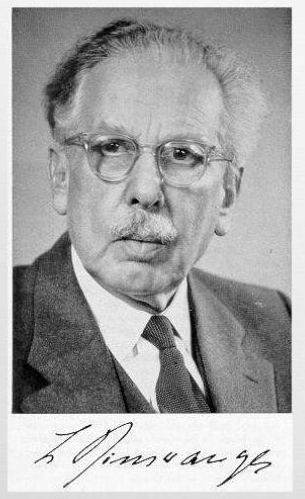
Ludwig Binswanger. Source: Alchetron
(free encyclopedia).
Ludwig Binswanger (1881-1966) was born in the small town of Kreuzlingen, part-way between Zurich and Constance in Switzerland. His German-Jewish grandfather, Ludwig "Elieser" Binswagner (1820-1880) founded the Bellevue Sanatorium, Kreuzlingen in 1857; an uncle, Otto Binswanger (1852-1929) was Professor of Psychiatry at the University of Jena. These biographical facts may help explain Binswanger's the greater independence from the Züurich group of psychoanalysts that between 1904-1913 formed around Carl Gustav Jung at the Burghölzli Mental Hospital in Zürich.
Educated at the University of Zürich, Binswanger received his MD in 1907. In March of that year, he accompanied Jung on a visit to Freud in Vienna. Whereas Freud's relationship with Jung was tinged with neurotic doubts about and desires for a younger inheritor to continue the work that Freud had begun, his relationship with Binswanger was more rational and enduring. In 1911 Binswanger became Medical Director of the Kreuzlingen Sanatorium. Ernest Jones (1955, "Dissensions") notes a letter from Freud to Binswanger dated Thursday May 23, 1912, in which Freud mentions a pending long-promised visit to Binswanger in Kreuzlingen, in return for the latter's early visit to Freud in Vienna. Traveling on a tight schedule, Freud omitted to call on Jung in Zürich while he was there. Jung thereafter referred to this omission as Freud's "gesture of Kreuzlingen," which then assumed a role in the rupture between the two that occurred later that year (Jones 1955; McGuire 1974).
The World War of 1914-1918 affected Binswanger personally and spiritually, even though his country remained neutral throughout. In March 1919, he was active in the new Swiss Psycho-Analytical Society which replaced the earlier one led by Jung. Along with Binswanger the new Council members included psychiatrist Emil Oberholzer (1883-1958), pastor Oskar Pfister (1873-1956) and psychologist Hermann Rohrschach (1884-1922), developer of the famous inkblot tests. Binswanger also attended the Sixth Congress of the International Psycho-Analytical Association, a reunion of psychoanalysts held in neutral Holland at The Hague in 1920, where he spoke on "Psycho-Analysis and Clinical Psychiatry," subsequently published in International Journal of Psychoanalysis. His later theoretical breadth, which increasingly integrated the existentialist and phenomenological orientations of thinkers such as Martin Heidegger and Martin Buber with insights gained from Freud, is beyond the present scope; see Bühler (2004). Binswanger died in Kreuzlingen.
Bibliography
Binswanger, Ludwig. Zur Geschichte der Heilanstalt Bellevue. Kreuzlingen, 1857-1932. (Toward a History of the Bellevue Sanatorium, Kreuzlingen, 1857-1932). Kreuzlingen, 1932.
B&uum;hler, Karl-Ernst. "Existential analysis and psychoanalysis: specific differences and personal relationship between Ludwig Binswanger and Sigmund Freud." American Journal of Psychotherapy 58.1 (2004): 34-50.
Jones, Ernest. The Life and Work of Sigmund Freud. Vol. II. London: Hogarth Press, 1955.
McGuire, W. The Freud-Jung Letters: The Correspondence Between Sigmund Freud and C.G. Jung. Princeton: Princeton University Press, 1974.
Created 25 March 2021